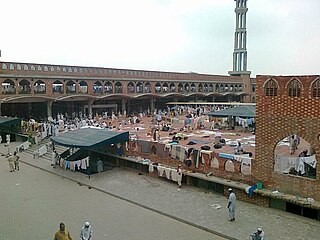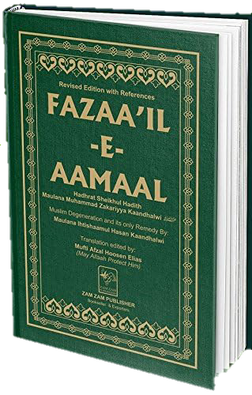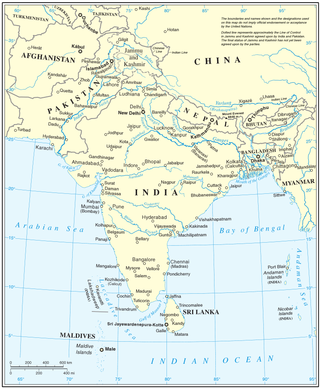Related Research Articles

The Deobandi movement or Deobandism is a revivalist movement within Sunni Islam that adheres to the Hanafi school of law. It formed in the late 19th century around the Darul Uloom Madrassa in Deoband, India, from which the name derives, by Muhammad Qasim Nanautavi, Rashid Ahmad Gangohi, and several others, after the Indian Rebellion of 1857–58. They consider themselves the continuation of Ahlus Sunnah wal Jamaat. The main purpose of this movement was to reject the grave worshipping, shirk and protect the orthodoxy of Islam from Bidah, as well as the influence of non-Muslim cultures on the Muslim of South Asia. The movement pioneered education in religious sciences through the Dars-i-Nizami associated with the Lucknow-based ulema of Firangi Mahal with the goal of preserving traditional Islamic teachings from the influx of modernist, secular ideas during British colonial rule. The Deobandi movement's Indian clerical wing, Jamiat Ulema-e-Hind, was founded in 1919 and played a major role in the Indian independence movement through its participation in the Pan-Islamist Khalifat movement and propagation of the doctrine of composite nationalism. The movement shares several similarities with Wahhabism.

Darul Uloom Deoband is an Islamic seminary in India at which the Deobandi movement began. It was established by the Indian Muslim theologians in the wake of the failure of War of Independence 1857 which had caused the abolition of Mughal Empire and politico-economic predicament of the South Asian Muslims. It aimed at reforming and uplifting the Muslim society on orthodox lines, and preserving the Muslim culture from the influence of modernism, Christian and Hindu missionary activities. It is located in Deoband, a town in Saharanpur district, Uttar Pradesh.

Tablighi Jamaat focuses on exhorting Muslims to be more religiously observant and encouraging fellow members to return to practising their religion as per the Islamic Prophet Muhammad, and secondarily give dawah (calling) to non-Muslims. "One of the most widespread Sunni" islah (reform) and called "one of the most influential religious movements in 20th-century Islam," the organisation is estimated to have between 12 and 80 million adherents worldwide, spread over 150 countries, with the majority living in South Asia.

The Barelvi movement, also known as Barelvism, is a Sunni revivalist movement following the Hanafi and Shafi'i schools of jurisprudence, and Maturidi and Ashʿari schools of theology with strong Sufi influences and with hundreds of millions of followers. It is a broad Sufi-oriented movement that encompasses a variety of Sufi orders, including the Chistis, Qadiris, Suhrawardi and Naqshbandis as well as many other orders and sub-orders of Sufism. They consider themselves to be the continuation of Sunni Islamic orthodoxy before the rise of Salafism and Deobandi Movement.

Muḥammad Ilyās ibn Muḥammad Ismā‘īl Kāndhlawī Dihlawī was an Indian Islamic scholar who founded the Tablighi Jamaat Islamic revivalist movement, in 1925, in Mewat province.

Raiwind is a town located within union council 149 (Dholanwal) in Allama Iqbal Town of Lahore, Punjab, Pakistan. The town serves as the headquarters of Tablighi Jamaat and hosts the annual Raiwind Markaz Ijtema. Raiwind is also home to Pakistan Railways Junction and Railways Track Workshop and serves as the political base for former Prime Minister Nawaz Sharif.

Fazail-e-Amaal, authored by Zakariyya Kandhlawi between 1929 and 1964, is a book that primarily consists of treatises from the Fada'il series, originally published in Urdu. Its purpose is to inspire and motivate Muslims in their religious practices by presenting a diverse range of Islamic teachings, stories, and anecdotes. The book's popularity has led to translations in multiple languages, including English and French, establishing it as a major resource for the Tablighi Jamaat, a transnational pietistic movement. Written at the request of Ilyas Kandhlawi, the founder of Tablighi Jamaat, the book was initially named Tablighi Nisab or Curriculum for Tabligh. It is the most popular ongoing publication of Urdu literature in the present era and is extensively read due to its inclusion in the literature of the Tablighi Jamaat. The book's language is appreciated for its simplicity, clarity, and accessibility to readers.
Abdul Rahim Muslim Dost is an Afghan journalist and jeweller and a former Islamist militant of Taliban and member of ISIL Khorasan Province in late 2015 he publicly disassociated himself from ISIL Khorasan and left militancy, condemning the killing of innocent people by ISIL in Afghanistan.
Hajji Sahib Rohullah Wakil is a citizen of Afghanistan who was held in extrajudicial detention in the United States Guantanamo Bay detention camps, in Cuba. His Guantanamo Internment Serial Number was 798. American intelligence analysts estimate he was born in 1962, in Jalalabad, Afghanistan. He has since been transferred from Guantanamo Bay to the American wing of the Pol-e-Charkhi prison in Kabul, Afghanistan. On November 18, 2019, the U.S. Department of the Treasury designated him for supporting activities of the ISIS branch in Afghanistan.

Malwali Masjid/Mosque, Kakrail Markaz is a mosque in the Kakrail neighbourhood of Ramna Dhaka, Bangladesh. Located near Ramna Park, it is the centre of the Tabligh Jamat in Bangladesh.
Thomas R. Metcalf is a historian of South Asia, especially colonial India, and of the British Empire. Metcalf is the Emeritus Sarah Kailath Professor of India Studies and Professor of History at the University of California, Berkeley. He is the author of Imperial Connections: India in the Indian Ocean Arena, 1860-1920 (2008), A Concise History of Modern India, Forging the Raj: Essays on British India in the Heyday of Empire (2005), Ideologies of the Raj (1997), and other books on the history of colonial India.
Jamal J. Elias is a scholar and professor of Religious Studies who currently serves as the Special Advisor to the Provost of Aga Khan University. He has written and lectured widely on the Qur'an, Sufism, poetry and modern society.
Jamaat-e-Islami is an Islamist movement founded in 1941 in British India by the Islamist author, theorist, and socio-political philosopher, Syed Abul Ala Maududi. It developed under the umbrella of Darul Uloom Deoband.
The Raiwind Mosque is a prominent Mosque in Raiwand, in Lahore District, Pakistan, associated with the charity Tablighi Jamaat. The Tablighi movement holds a large annual festival in Raywand.

Raiwind Markaz is a complex consisting of a main mosque, Islamic madrasa, and residential areas located in Raiwind city, near Lahore, Pakistan, and is the home of the Tablighi Jamaat in Pakistan. It attracts many people to its yearly gathering, including international visitors.

Islam is the second-largest religion in South Asia, with more than 640 million Muslims living there, forming about one-third of the region's population. Islam first spread along the coastal regions of the Indian subcontinent and Sri Lanka, almost as soon as it started in the Arabian Peninsula, as the Arab traders brought it to South Asia. South Asia has the largest population of Muslims in the world, with about one-third of all Muslims living here. Islam is the dominant religion in half of the South Asian countries. It is the second largest religion in India and third largest in Sri Lanka and Nepal.
A Tablighi Jamaat religious congregation that took place in Lahore's Raiwind Markaz in early March 2020 was a COVID-19 super-spreader event with more than 539 confirmed cases linked to the event being reported across the country. Science and Technology Minister Fawad Chaudhry blamed the "stubbornness of the clergy" for the event having gone ahead despite the COVID-19 pandemic.

Revival from Below: The Deoband Movement and Global Islam is a book by Brannon D. Ingram, a professor affiliated with Northwestern University. This scholarly publication, brought to readers in 2016 through the University of California Press, explores the reformist agenda of the Deobandis and delves into the understudied aspect of their expansion beyond South Asia, with a particular focus on South Africa. The author reexamines the Deobandis' articulation of their reformist goals, unveiling a dimension that has received inadequate scholarly attention: their networks' reach and influence in regions outside of South Asia. The author offers compelling insights into the meaning of the Deobandi tradition and delves into the Deobandis' understanding of religious and social reform. Through a balanced approach encompassing both textual sources and individual agency, Ingram elucidates the intricate dynamics of Deobandi practices and analyzes the implications of their transnational expansion in the post-colonial era. Despite its paramount significance, the Deobandi stream of thought within Hanafi Islam is often subject to misinterpretation and unwarranted criticism. In reality, it stands as an influential Muslim reform and revival movement, surpassing all others outside of the Middle East.

This bibliography of Deobandi Movement is a selected list of generally available scholarly resources related to Deobandi Movement, a revivalist movement within Sunni Islam, adhering to the Hanafi school of law, formed in the late 19th century around the Darul Uloom Deoband in British India, from which the name derives, by Qasim Nanawtawi, Rashid Ahmad Gangohi and several others, after the Indian Rebellion of 1857–58. It is one of the most influential reform movements in modern Islam. Islamic Revival in British India by Barbara D. Metcalf was the first major monograph specifically devoted to the institutional and intellectual history of this movement. Muhammad Tayyib Qasmi wrote a book named The Tradition of the Scholars of Deoband: Maslak Ulama-i-Deoband, a primary source on the contours of Deobandi ideology. In this work, he tried to project Deoband as an ideology of moderation that is a composite of various knowledge traditions in Islam. This list will include Books and theses written on Deobandi Movement and articles published about this movement in various journals, newspapers, encyclopedias, seminars, websites etc. in APA style. Only bibliography related to Deobandi Movement will be included here, for Darul Uloom Deoband, see Bibliography of Darul Uloom Deoband.

This bibliography of Darul Uloom Deoband is a selected list of generally available scholarly resources related to Darul Uloom Deoband, a leading Islamic seminary and Muslim theological centre in India at which the Deobandi movement began, founded in 1866. It is one of the most influential reform movements in modern Islam. It created a largest network of satellite madrasas all over the world especially India, Bangladesh, Pakistan, Afghanistan neighboring countries in Asia and beyond, and as far afield as the Caribbean, South Africa, United Kingdom and the United States. Islamic Revival in British India by Barbara D. Metcalf was the first major monograph specifically devoted to the institutional and intellectual history of Deoband. Syed Mehboob Rizwi wrote History of Darul Uloom Deoband in 1977 in 2 volumes. This list will include Books and theses written on Darul Uloom Deoband and articles published about Deoband in various journals, newspapers, encyclopedias, seminars, websites etc. in APA style. Only bibliography related to Darul Uloom Deoband will be included here, for Deobandi movement, see Bibliography of Deobandi Movement.
References
- 1 2 Gilmartin, David. "Barbara D. Metcalf Biography". American Historical Association. Retrieved 5 July 2014.
- ↑ Murat Kurnaz ARB, Department of Defense , pages 96–98
- ↑ Choudhury, Salah Uddin Shoaib (2020-04-17). "Tablighi Jamaat, the antechamber of fundamentalism and terrorism". BLiTZ. Retrieved 2022-05-17.